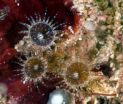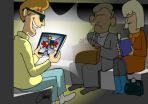(Press-News.org) The use of technology in the classroom is nothing new, but Topcliffe Primary School in Birmingham is breaking new ground by using technology to help pupils with autism communicate more effectively.
The school, which teaches around 30 children with various levels of autism, was one of four schools across UK, which participated in the ECHOES research project, jointly funded by the Economic and Social Research Council (ESRC) and the Engineering and Physical Science Research Council (EPSRC) from universities across the UK to explore how technology can make a difference in the classroom. The researchers used the Technology Enhanced Learning (TEL) programme ECHOES which allows children to engage with virtual characters and interactive technologies.
"Children interact with echoes through a large multi-touch screen," says Dr Kaska Porayska-Pomsta, the leader of the project and a senior lecturer in Technology-Enhanced Learning at the Institute of Education, London Knowledge Lab.
"Through the screen they can manipulate objects, explore the environment and they can also interact with the semi autonomous agent called Andy. Andy acts as a social partner to children and tries to actively engage children in specific activities."
Teachers at the school have found that the ECHOES program has greatly helped the children improve their social and communication skills. In fact teachers were surprised at the extent to which the children engaged with the technology.
"We never realised that the children had these skills because some of them are so locked in." Says Sarah Quickendon, a Spectrum Disorders Teacher at Topcliffe School.
"We watched children with autism playing with the images on the screen in ways in which none of the typically developing children had done. The normal curriculum that we were offering just wasn't allowing them to demonstrate these skills to us."
Research shows that children with autism often find computers and technology safe, motivating and engaging, particularly in the areas of social interaction and communication. Autistic children often struggle to communicate and learn effectively, but it seems that this technology can tap into their motivation and enable them to communicate in a way in which teachers simply can't get them to do in traditional classroom settings.
However it was not just children with autism that benefited from the project, as all the children engaged with ECHOES.
"The Echoes project has raised aspirations for children, for school staff and for all the community" says Ian Lowe, the Headteacher of Topcliffe School
The researchers developed ECHOES, not just as a way of helping children with autism communicate, but also as a tool for researchers, teachers, parents, and practitioners to better understand individual children's strengths and difficulties, and the ways in which these may be addressed through technological intervention.
###
For further information contact:
Dr Kaska Porayska-Pomsta
Email: k.porayska-pomsta@ioe.ac.uk
Telephone: 020 7763 2167
ESRC Press Office:
Sarah Nichols
Email: sarah.nichols@esrc.ac.uk
Telephone: 01793 413122
Jeanine Woolley
Email: jeanine.woolley@esrc.ac.uk
Telephone: 01793 413119
Notes for editors
1. This release is based on the findings from Echoes 2: Improving children's social interaction through exploratory learning in a multimodal environment, jointly funded by the ESRC and EPSRC and carried out by Dr Kaska Porayska-Pomsta, Professor Annalu Waller, Dr Helen Pain, Dr Judith Good, Dr Karen Guldberg, Dr Gnanathusharan Rajendran and Miss Wendy Keay-Bright. It is a collaboration between the Institute of Education, Heriot Watt University, the University of Edinburgh, Birkbeck College, the University of Birmingham, University of Wales Institute, Cardiff, the University of Dundee, the University of Strathclyde and the University of Sussex.
2. The ECHOES team are preparing the results of the project's final evaluation studies for publication in 2013.
3. You can watch the 'Helping children with autism' video here
4. ECHOES 2 employed a participatory design and iterative implementation methodology for both the learning experience and the technology able to support it.
5.The Economic and Social Research Council (ESRC) is the UK's largest organisation for funding research on economic and social issues. It supports independent, high quality research which has an impact on business, the public sector and the third sector. The ESRC's total budget for 2012/13 is £205 million. At any one time the ESRC supports over 4,000 researchers and postgraduate students in academic institutions and independent research institutes.
6. The Engineering and Physical Sciences Research Council (EPSRC) is the UK's main agency for funding research in engineering and physical sciences. EPSRC invests around £800 million a year in research and postgraduate training, to help the nation handle the next generation of technological change. The areas covered range from information technology to structural engineering, and mathematics to materials science. This research forms the basis for future economic development in the UK and improvements for everyone's health, lifestyle and culture.
Technology use in the classroom helps autistic children communicate
2012-11-29
ELSE PRESS RELEASES FROM THIS DATE:
Scientific advice to ensure the sustainability of shark populations in Ocean waters
2012-11-29
Together with the Basque R+D centre's researchers, the group of advisers is made up of researchers from the Spanish Institute of Oceanography (IEO), the French Institute for Exploration of the Sea (IFREMER), the French Institute for Research for Development (IRD),and the Portuguese Institute for Fisheries and Sea Research (IPIMAR).This work comes within the 'European Community's Action Plan on Sharks' which has funding from the European Commission's Directorate-General for Maritime Affairs and Fisheries, and is set to take 15 months.
Shark are caught with fishing gear ...
Next-generation treatments for Fragile X syndrome
2012-11-29
Philadelphia, PA, November 29, 2012 – A potential new therapeutic strategy for treating Fragile X syndrome is detailed in a new report appearing in the current issue of Biological Psychiatry, from researchers led by Dr. Lucia Ciranna at University of Catania in Italy.
Fragile X syndrome (FXS), the most common heritable form of autism and intellectual disability, is one of the most exciting areas in brain research at the moment.
A decade ago, Dr. Mark Bear and his colleagues discovered that an animal model for FXS was associated with a distinctive alteration in brain ...
Researchers create a fly to study how a normal cell turns cancerous
2012-11-29
The wing of a fruit fly may hold the key to unraveling the genetic and molecular events that transform a normal cell into a cancerous one. The study, conducted on Drosophila melanogaster by scientists at the Institute for Research in Biomedicine (IRB Barcelona) and led by ICREA researcher Marco Milán, has reproduced each of the steps known to take place when a healthy cell turns cancerous. The researchers have thus provided an inexpensive and effective model that will allow the scientific community to scrutinize the genes and molecules involved in each step. Given that ...
Homicide spreads like infectious disease
2012-11-29
EAST LANSING, Mich. — Homicide moves through a city in a process similar to infectious disease, according to a new study that may give police a new tool in tracking and ultimately preventing murders.
Using Newark, N.J., as a pilot case, a team of Michigan State University researchers led by April Zeoli successfully applied public health tracking methods to the city's 2,366 homicides between 1982 and 2008. They found the killings were not randomly located but instead followed a pattern, evolving from the city's center and moving southward and westward over time.
Like ...
Cancer drug shows promise in eradicating latent HIV infection
2012-11-29
Bethesda, MD—Breakthrough drugs have made it possible for people to live with HIV longer than ever before, but more work must be done to actually cure the disease. One of the challenges researchers face involves fully eradicating the virus when it is latent in the body. A new report appearing in the December 2012 issue of the Journal of Leukocyte Biology suggests that a cancer drug, called JQ1, may be useful in purging latent HIV infection by activating the virus in the presence of potent therapy – essentially a dead end for the virus.
"This drug may be useful as adjunctive ...
Travels in northeastern Brazil: Unfolding the reptile fauna of Lençóis Maranhenses
2012-11-29
In order to be effective, a Conservation Unit must have available a list of the species that live within it. They also should have detailed information about the distribution of species among the available habitats. It would be difficult to correctly plan the conservation actions and/or monitoring programs without some minimal knowledge about the species (who are the object of those measures). "This is why our study is so important to the park", said Dr. Miranda from Universidade Federal do Maranhão (CCAA/UFMA), leading author of the article, published in the open access ...
An ocean away: 2 new encrusting anemones found in unexpected locations
2012-11-29
As a result of field work by associate professor James Davis Reimer and two graduate students from the University of the Ryukyus in Okinawa, Japan has found two new species of encrusting anemones, or colonial zoanthids, in unexpected locations. The species belong to the genus Neozoanthus, which was previously known only from a single species in the Indian Ocean. Surprisingly, the new species were found in the Pacific Ocean, in southern Japan and on the Great Barrier Reef, Australia. The study was published in the open access journal ZooKeys.
The only previous species ...
Black hole upsets galaxy models
2012-11-29
This press release is available in German.
A group headed by Remco van den Bosch from the Max Planck Institute for Astronomy has discovered a black hole that shakes the foundations of current models of galaxy evolution. This monster has 17 billion solar masses and is thus significantly heavier than the models predict. And even more significantly: the object could be the most massive black hole known to date.
Astronomers believe there is a super-massive black hole at the heart of every galaxy. Its mass ranges from several hundred thousand solar masses to a few billion. ...
Inviting customer complaints can kill business: UBC research
2012-11-29
Giving customers a chance to complain can be a bad idea if customers believe they're to blame for a product's failure, a new study from the Sauder School of Business at UBC shows.
"It's commonly assumed that giving customers a chance to voice grievances allows companies to maintain relationships," says Marketing Professor Darren Dahl, who co-authored the recent Journal of Marketing study with PhD student Lea Dunn.
"But our research shows that when a person feels implicated in a product's failure – think building Ikea furniture – they're more likely to shift blame to ...
Maths helps mobiles & tablets match eyes' ability to switch from sunshine to shadow
2012-11-29
Researchers have pushed the boundaries of High Dynamic Range (HDR) video to match our own eyes' ability to cope with the real world's ever rapidly changing light intensity - such as sun simply going behind clouds. Now researchers at WMG at the University of Warwick, have found a way to compress and stream HDR video directly to monitors and mobile devices, such as an iPad, bringing enormous benefits to industries including gaming and security.
Researchers at WMG at the University of Warwick, working in partnership with spinout company goHDR Ltd, have succeeded in achieving ...





